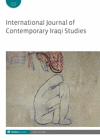- Home
- A-Z Publications
- International Journal of Contemporary Iraqi Studies
- Previous Issues
- Volume 9, Issue 3, 2015
International Journal of Contemporary Iraqi Studies - Volume 9, Issue 3, 2015
Volume 9, Issue 3, 2015
-
-
Suq Al-Saray, Al-Mutanabbi Street and the book trade in Baghdad in the 1940s: A personal narrative
More LessAbstractA personal narrative describing the selling and publishing of books in Baghdad in the 1940s in the old Suq Al Saray where virtually all bookshops were located at that time. The essay also includes consideration of Al Mutanabbi Street which became associated with the public marketing of books and other publications. It is shown that the period considered reflects on a society, city and a country that had many positive features such as cohesion, aspirations and strengths that have virtually little resemblance to the Iraq and Baghdad of recent decades.
-
-
-
Expanding the mission: The Alliance Israélite Universelle, the Anglo-Jewish Association and the Jewish Boys’ School in Basra, 1890–1903
More LessAbstractIn the late nineteenth century the French–Jewish Alliance Israélite Universelle (AIU) established and administered primary schools for Jewish communities throughout the Muslim world, with a focus on North Africa and the Ottoman Empire. The AIU’s actions in the territories that later became Iraq have been seldom studied compared to the schools in other geographic areas and have been almost totally ignored with regard to Basra. This article utilizes the letters of the Archives of the Alliance Israélite Universelle (AAIU) and other select primary sources to explore the AIU’s, and to a lesser extent its sister organization’s, the Anglo-Jewish Association’s (AJA), relationship with the Jewish community in Basra in the 1890s and early 1900s leading to the AIU’s takeover of the Basra Jewish School in 1903. In doing so it provides a foundation for future scholars to more fully examine both the AIU’s subsequent work in the city and also the history of Basra’s Jewish community in the first half of the twentieth century.
-
-
-
The consistency of the Iraqi claims on Kuwait during the monarchy and the republic: 1921–1963
More LessAbstractIn 1990, Iraq invaded Kuwait; this action was a shock to the rest of the world. However, this action was not unprecedented. Historically, Iraq has laid claim to Kuwait since before World War I. In this research, I discuss the main occurrences of and reasoning behind Iraq’s claims on Kuwait. The main objective of this research is to highlight the importance of incorporating the historical relationship between the two countries in research relating to Arab countries. Historically, economically and socially Iraq’s claim to Kuwait is not resolved. Therefore, the UN demarcation of the borders between the two neighbours should not lead us to believe that this dispute is buried forever.
-
-
-
The social contract and the Iraqi state
More LessAuthors: Jacqueline S. Ismael and Tareq Y. IsmaelAbstractThe Anglo-American invasion and occupation of Iraq from 2003 destroyed the Iraqi state in an effort to implant a neoliberal order consonant with wider global design. Despite the humanitarian devastation, however, the destruction of the Iraqi state was insufficient to fracture the national sense of commonweal developed over the modern period. The occupation and implanted new political regime, therefore, focused on the elimination of the widespread and popular Iraqi commitment to beneficial social goods arising out of the exploitation of national resources. Akin to the modern Iraqi state’s effort to develop national citizenry as informed by the ancient archeological record of civilized habitation, a project that met with the defilement of Iraqi culture following 2003, the modern state project had also bound Iraqis to a citizenship based on social programs supported by the natural wealth found under Iraqi soil. With the CPA and its successor governments, the tether between Iraq’s various communities was ruptured through sectarianism and immense political violence. Through a novel exploration of the concept of social contract, this article explores what held Iraqis together as a community and the concerted effort to fracture those ties. The revolutionary government under Prime Minister Abd al-Karim Qasim is highlighted for its role in crafting the progressive and aspirational social compact that successor regimes – regardless of orientation – heeded in order the legitimize themselves. The Ba’thist alterations and modifications are explored in an effort to better understand the landscape prior to the devastation of war, sanctions and occupation that came to confront the Iraqi people with such ruthlessness. Such an analysis presents potential for the formulation of future research to identify successive indigenous solutions to the cleavages found within Iraqi society. Such native solutions would seemingly better inform potential pathways out of the conflagration escalated through external imposition.
-
-
-
Reviews
More LessAuthors: Ghada Hashem Talhami and John MeasorAbstractWomen in Iraq: Past Meets Present, Noga Efrati (2012) New York: Columbia University Press, 236 pp., ISBN: 9780231158145, h/bk, $45.00
Against All Odds: Voices of Popular Struggle in Iraq, Ali Issa (2015) Washington, DC: Tadween Publishing, 90 pp., ISBN: 9781939067166, p/bk, $11.99
-
Most Read This Month


